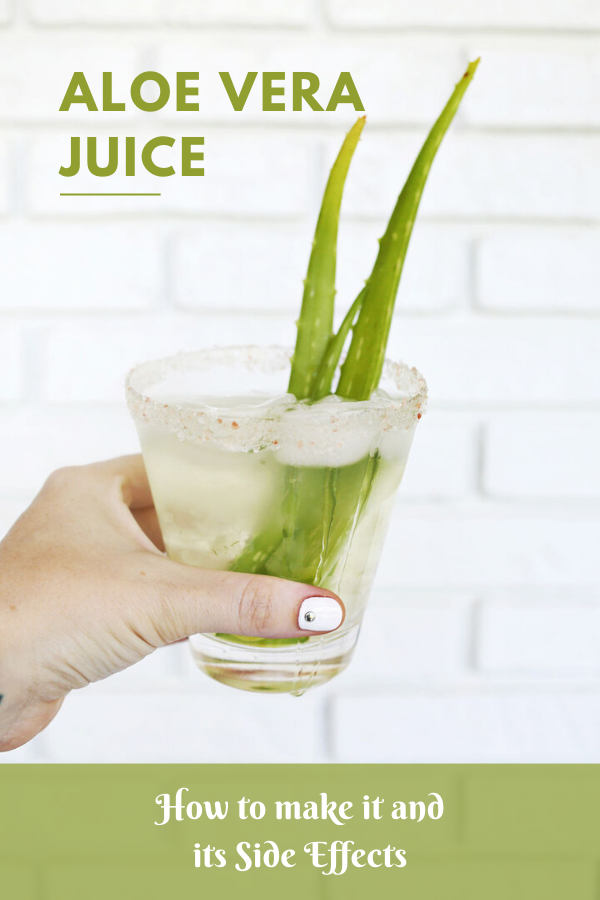
We are sure you must have enjoyed reading the Benefits of Aloe Vera for your Health and Beauty, here. Today, we bring to you how to make your own Aloe Vera Juice at home and what you should be aware of before consuming Aloe Vera and making it a part of your beauty and health regime.
It is important to understand that all natural products are not safe for consumption by everyone. Based on the health condition of an individual and considering the side-effects of product, one needs to make a choice.
How to make Aloe Vera Juice
This is how you can make your own aloe vera juice at home and enjoy more health benefits without artificial sweeteners and additives. It is very easy to grow an Aloe Vera plant at home, providing the right water and climate conditions.
Aloe vera contains substances, gel and latex, which have different properties and medicinal use. Aloe vera gel is a jelly like substance that is extracted from the interior of the aloe vera leaf, while latex refers to the yellow part which lies beneath the leaf skin.
- Trim the ends of a matured aloe plant as it will have more antioxidants.
- Cut open the stem from the middle section and take out the clear gel, avoiding the yellow latex.
- Now, put this clear gel in a blender and either add three to five citrus fruits or 1 cup water.
- Blend thoroughly to get pure Aloe Vera Juice. You can place this juice in the freezer and leave it for at least two hours
Read about the antioxidant Goji Berries here.
Side Effects of Aloe Vera
We know how Aloe Vera Juice can aid in digestion, boost immunity, help in detoxification and stimulate metabolism. But there are certain risks and side effects involved in taking Aloe Vera in the form of Juice or Gel internally –
1. Diarrhea
Aloe, in its natural form, has laxative properties that are strong and on a higher side. An excess administration may cause diarrhea, bloating and abdominal cramps. When processed in the form of a juice, the aloin presence in Aloe is made thinner and well diluted to derive a lighter form.
According to a press release by ‘The international Aloe Science Council’ in 2013,”The vast majority of certified aloe vera products contain less than 1 ppm aloin.”
Another report on Quality Control of Aloe Vera Beverages‘ by ‘Electronic Journal Of Enviormental, Agricultural and Food Chemistry’ says ‘ Aloe vera products are only suitable for human consumption if they are free from aloin, a native Aloe vera constituent that acts as a laxative and is supposed to be a DNA-damaging and carcinogenic agent. Aloin can be prevented from entering the production process if the outer layers of the Aloe plant, containing the highest quantities of aloin, are discarded before extracting the juice.”
“Aloe vera beverages are extensively controlled by the official food control and nowadays most products abide by the legal aloin limit. Aloe vera products may be considered aloin-free if the maximum limit of 0.1 mg/l is not exceeded.”, the journal further adds.
With such warnings on regulated control of aloin in Aloe Juice, it’s important to ensure vigilance before deciding on the right brand of Aloe Juice.
2. Electrolyte Imbalance
The stimulant laxatives in unprocessed aloe vera juice can cause electrolyte imbalance and dangerously low potassium and blood sugar levels with frequent use. Low potassium levels in the blood results in weakness, and irregular heartbeats.
3. Drug interactions
Aloe Vera juice internally can cause adverse interactions with prescription and over-the-counter medications. Aloe vera may inhibit or increase the effects of some drugs, like –
- Digoxin (Lanoxin) interacts with Aloe as Stimulant laxatives in Aloe can decrease potassium levels in the body increasing the risk of side effects of Digoxin (Lanoxin).
- Medications for diabetes interact with Aloe as both decrease blood sugar, causing blood sugar to go too low.
- Medications taken by mouth interact with Aloe as aloe latex might decrease the absorption of the medicine in your body, decreasing its effectiveness.
- Sevoflurane (Ultane) interacts with Aloe
Sevoflurane, which is used as anesthesia during surgery, decreases clotting of the blood. And aloe can decrease clotting of the blood too. So it advised not to take aloe before a surgery atleast 2 weeks prior to having a surgery.
- Stimulant laxatives interacts with Aloe as both are laxatives and can speed up bowels too much causing dehydration and low minerals in the body.
- Warfarin (Coumadin) interacts with Aloe as laxatives in Aloe cause diarrhea. Diarrhea can increase the effects of warfarin and increase the risk of bleeding.
- Water pills (Diuretic drugs) interacts with Aloe as both decrease potassium levels in the body, making it dangerously low.
4. Carcinogenic Risk
The National Toxicology Program (NTP) have raised a warning flag, after studies found carcinogenic activity in rats that consumed extracts of aloe vera. Although the studies have not been proved in humans, but if aloin is to blame the tumors in rats, the possibility of a carcinogenic risk in humans cannot be ruled out. Intake of aloe vera juice is associated with the risk of colorectal cancer.
Read about Cancer fighting Superfoods, here.
5. Aggravated Certain Health Problems
- Aloe vera juice, containing the aloe latex can aggravate health problems like Crohn’s disease, colitis, intestinal obstruction, diverticulitis, appendicitis, hemorrhoids, stomach pain or ulcers.
- Some people with liver problems have reported hepatitis caused by internal consumption of aloe.
- Aloe belongs to the Liliaceae family and if you’re allergic to that family — such as to garlic, onions, and tulips, then, you may probably have a high degree of developing Aloe Vera juice side effects.
6. Unsafe during Pregnancy and Lactation
Consuming aloe vera juice during pregnancy, or while breast feeding is strictly prohibited due to its irritant and purgative properties. Aloe vera should be restricted while breastfeeding, as the presence of anthraquinones in the breast milk may cause diarrhea.
In pregnant women, aloe vera juice can cause uterine contractions, and even result in a spontaneous miscarriage, according to the University of Maryland Medical Center. It is not safe for consumption by children below twelve years of age, as it can lead to diarrhea and abdominal cramps.
If you are interested in reading about Superfoods that can help you get pregnant, please read here.
So like we always say, before taking any health supplement, consult with your health care provider first.
Enjoyed Aloe Vera Juice – How to make it and its Side Effects? Share it with your friends so they too can follow the Superfoodsliving journey.
Share on Pinterest
